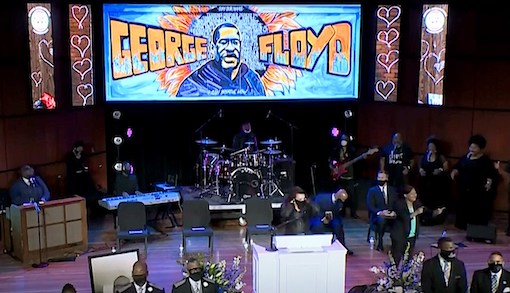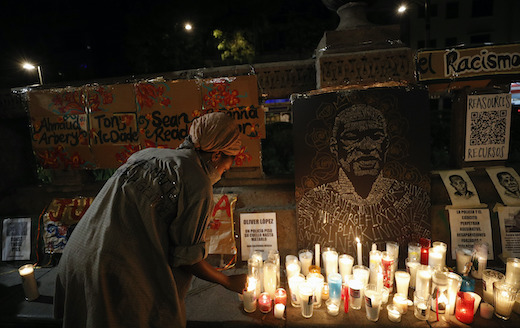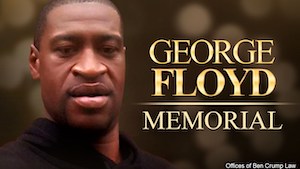This article quite correctly points out that when the people engage in righteous rebellion and want to have things change for the better , the system buys them off with minor reforms or promises that never see the light of day, thus subverting the struggle and it's goals and pulling people into the myth of progress through voting or other meaningless drivel .
As usual, not everything in theis piece I agree with, but it's a good one and worthy of further thought and discussion . Read it.
After explosive uprisings and demonstrations in cities large and small, murder charges were filed against Mr. Chauvin with the three other former officers involved—J. Alexander Kueng, Thomas Lane and Tou Thao—charged with aiding and abetting second-degree murder. All four men are behind bars with bails set with million dollar bonds or close to it.
“If you listen to my peers, political pundits, and religious leaders—they are all saying the same thing. That is, giving an analysis on race that we all know; and creating review panels, registering people to vote and developing new legislation. In the meanwhile, Whites are becoming more grounded. That is, increased arms, radical anti-Black polemics and an ideal that its ‘us against them.’ They’re seeing this as their last stand. Remember, Custer?”
“We have enough history behind us to know all the tricks. For the young folks today enough is enough for them. They are tired of business as usual. What we have to look out for now is the diversion. We saw it in the Vietnam War demonstrations, 9-11, the War on Iraq, etc., all diversions to take the peoples’ focus somewhere else. Here we are again. We cannot allow the energy of young people to be railroaded or watered down.”
As usual, not everything in theis piece I agree with, but it's a good one and worthy of further thought and discussion . Read it.
Questions remain in the fight for justice for George Floyd and Black America
BY NISA ISLAM MUHAMMAD AND MICHAEL Z. MUHAMMAD THE FINAL CALL @THEFINALCALL | LAST UPDATED: JUN 9, 2020 - 1:38:42 AM
In the days since the country erupted in protests after the death of George Floyd in the custody of Minneapolis police officers, a public memorial service was held in that city, followed by another memorial in Raeford, N.C. before the father, brother and uncle was laid to rest in Houston.
Emotions are still raw despite the cops being fired and charges being filed. Millions witnessed White officer Derek Chauvin press his knee on Mr. Floyd’s neck for over eight minutes as the 46-year-old Black man lost his life.

George Floyd’s memorial service held in Minneapolis, Minnesota. Photo: MGN Online
|
After explosive uprisings and demonstrations in cities large and small, murder charges were filed against Mr. Chauvin with the three other former officers involved—J. Alexander Kueng, Thomas Lane and Tou Thao—charged with aiding and abetting second-degree murder. All four men are behind bars with bails set with million dollar bonds or close to it.
While some saw charges filed as a victory, others cautioned it was only the first step in the ever-elusive fight for justice for Black people and question remains: What is next?
“I want us to not sit here and act like we had a funeral on the schedule. George Floyd should not be among the deceased. He did not die of common health conditions. He died of a common American criminal justice malfunction. He died because there has not been the corrective behavior that has taught this country that if you commit a crime, it does not matter whether you wear blue jeans or a blue uniform, you must pay for the crime you commit,” said Rev. Al Sharpton who delivered remarks at the June 4 memorial in Minneapolis.
The Minneapolis city council banned the use of chokeholds by police and requires them to report and intervene when they see another officer use unauthorized force. Human Rights Commissioner Rebecca Lucero said the changes are necessary to stop ongoing harm to people of color “who have suffered generational pain and trauma as a result of systemic and institutional racism.”
“This is just a start,” she said. “There is a lot more work to do here, and that work must and will be done with speed and community engagement.”
By June 7, the Minneapolis city council was saying it wanted to disband the police department and create something better with an expanded view on what constitutes safe and delivering services with less focus on the use of force. In other cities and towns, police departments have been disbanded and county police or sheriffs’ departments have taken over law enforcement. It does not mean zero officers will be on the streets.
Community control of police
The no chokehold provision requires court approval and would be enforceable in court. This ban is different from the police department’s current policies on the use of force and officer responsibilities to intervene when excessive force is used. The new ban requires officers to immediately report to their superiors when they see use of any neck restraint or chokehold.
Eliminating chokeholds is part of the solution, said Zaki Baruti, president of the African Peoples Organization. But he stressed that there must also be community control of the police. “The police force should reflect the racial ethnicity of the community and live in the community they serve. There must also be a civilian oversight board with subpoena power. We also want chokeholds and kneeling on necks barred. If an officer has more than three or four complaints he is suspended,” the St. Louis-based activist said.
“We also want proportional political power. We are 13 percent of the population. We only hold 4 percent of political offices. If we held more that would open up more jobs and contracts with conscious elected officials. There’s not one Black governor and that’s a damn shame,” he said. “In Ferguson, (Mo.) which was 68 percent Black before Mike Brown’s death, we only had one Black person on the city council. A police force of 53 officers only had 3 Blacks. This shows a lack of political power.”
He added, “We need to appeal to the African Union and CARICOM (the Caribbean Community regional organization) to condemn the U.S. for its treatment of Black people. To ensure reforms, we want sustained economic boycotts. You kill us, we kill your economy so says Rev. Clinton Stancil from St. Louis.”
In the nation’s capital, Washington, D.C. Mayor Muriel Bowser responded to moves by President Donald Trump to bring the military into the District by renaming a street in near the White House “Black Lives Matter Plaza.” She had the slogan painted on the asphalt in massive yellow letters to honor demonstrators urging changes in law enforcement.
Salim Adolfo, a D.C. Ward 8 Advisory Neighborhood Commissioner and national secretary of the Black United Front, said, “Unfortunately, there is no way to legislate against the ill-will or the hate someone may hold towards another person. However, what we can do as elected officials is implement policies that work towards protecting the human rights of our residents.”
He suggests people become actively engaged in organizations, or financially support groups working toward improving the quality of life for Black people. He also advised holding voter education and registration forums on how to nominate, finance, elect and back progressive politicians in support of radical police reform. People should file police complaints and become part of a Citizen Advisory Council, he added.
Reasons for skepticism
Dr. Issa Muhammad, history professor at the University of Central Florida, is skeptical about what he’s seeing. “Real change will come from the outside—that is, the people of the world. Pressure such as economic sanctions on the USA that is being discussed now and a global investigation of human rights violations; again, something that is being discussed among several representatives in the UN. However, the African American community lacks the full strength of taking the resistance movement to the next level,” said Dr. Muhammad.

A woman lights a candle in front of a display of images commemorating victims of police violence, during a peaceful demonstration denouncing racism and calling for justice, in Mexico City, June 4. Photo: AP Rebecca Blackwell
|
“If you listen to my peers, political pundits, and religious leaders—they are all saying the same thing. That is, giving an analysis on race that we all know; and creating review panels, registering people to vote and developing new legislation. In the meanwhile, Whites are becoming more grounded. That is, increased arms, radical anti-Black polemics and an ideal that its ‘us against them.’ They’re seeing this as their last stand. Remember, Custer?”
Whites are ready to “go the distance,” Dr. Issa Muhammad explained. “I am not quite sure if we are. Our rebellion stops as mentioned before—voting, court cases, and legislation. Also, note, the narrative now is not being pushed by the grassroots any longer. But by political-corporate entities who will manipulate this setting for themselves.”
Keith Howell, an educator and activist from Newark, New Jersey, told The Final Call he has mixed emotions because “we have been through this before.” “It looked like it was going to be justice only to have the rug pulled from under us. I just don’t know. First the police officers should be convicted. If they are not, then a tremendous fight will lay before us,” he said.
Youth have to be galvanized, added Mr. Howell. “They have had enough. I think we are looking at revolution. Being a student of history, we are witnessing history in the making. It’s larger than just police killings. I’m not convinced a conviction is forthcoming.”
Pam Africa of MOVE agrees that involvement of youth is a key in moving forward. “We can’t make the mistakes of the past by relying on politicians. This protest to me was more spiritual with support from people around the world. Politicians speaking more strongly than they have ever spoke before. It is our job to keep the pressure on and don’t back up,” said Ms. Africa. MOVE is all too familiar with police terrorism and brutality. The Black revolutionary organization was the victim of one of the most heinous acts of terror in American history when their compound was bombed by the Philadelphia Police Department in 1985 killing 11 people including children.
“The focus going forward should be local, in Philly, with our city council,” argued Pam Africa. “Let’s check police budgets. We need people from the community to voice how things in the future should go,” she added, before cautiously noting that the fight is not over.
“Right now the power structure is trying to figure out how to get around this movement. I have watched. I have seen them turn people against one another. People have got to stay consistent. They need to stand on truth, the principle of righteousness, and don’t move from it. This protest movement was not an organized thing; it was a spontaneous thing. It was organized by a much higher force. It is up to us to keep this momentum going. Now people are going back into their communities and they need to teach. There are a lot of people who still don’t know the real issues,” said Ms. Africa.

Photo: MGN Online
|
“We must not allow division,” she continued. “The issues are at a level where they have never been before. We must keep that momentum going. For us in MOVE it has been a very good year. All of the MOVE 9 are out of jail and home. The issue of police terrorism is front and center, the (former Philadelphia police commissioner and mayor Frank) Rizzo statue came down. What a great year. The power of truth is final.”
Confronting systematic problems
In 1987 Ford Heights, Illinois, was considered the poorest suburb in America. Not much has changed if you ask Emir Hardy, executive director of that city’s F.U.T.U.R.E. Foundation. It was established in 1987 to improve the quality of life in Chicago’s south suburbs.
“People have basic needs that must be met before they can be a good citizen or a good neighbor. They need food, clothing, shelter and love. We’ve never been accepted here. We’re not feeling love here. We need to get to the basics after that we can get to the other things,” he told The Final Call.
“Some of the people looting were opportunistic but others were just getting things they needed. We need to know these changes will take time. I’ve been doing this for 35 years. These problems are systemic. People have seen their parents in this situation. In Ford Heights there are no grocery stores, no fresh fruit, only corner stores,” said Mr. Hardy.
The problem with corner stores in the Black community was a catalyst that led to cops being called on George Floyd. He was suspected of passing a counterfeit $20 at a corner store and a clerk called the police. There are challenges with immigrant-owned businesses in predominantly Black inner city neighborhoods.
IMAN (Inner City Muslim Action Network) in Chicago launched The Corner Store Witness initiative on June 5. The initiative begins with the presumption that there is no “race-neutral” space in America and that many corner stores, gas stations, food and liquor establishments in inner city communities across the country occupy a highly charged and racialized space crafted by decades of disinvestment, redlining, food deserts, criminalization and violent policing tactics.
Rami Nashashibi, IMAN executive director, said at the initiative launch, “These Palestinian store owners in Southside Chicago are behaving in a manner similar to Israeli settlers on occupied Palestinian land. Go beyond logic and dictates of capitalism. This logic abuses people,” he explained.
The initiative will provide trainings for store owners on how to properly interact with the Black community.
Dr. Tony Monteiro, a Philadelphia-based activist, said the question of what must be done moving forward is an important one. “I think what we have witnessed over the last 10 days is an emotional outpouring. We watched demonstrations in large cities with significant Black populations. But, the majority of marchers were White. It is as if it was a collective psychological outpouring of White folk trying to come to terms with White guilt over White supremacy,” said Dr. Monteiro.
“As for the question of going forward, some significant reforms have to be made rather than ‘willy nilly’ ideas of the past. Reforms including taking money from police budgets and transferring it to social programs,” he said.
The fight continues
For many what’s next is more protests and demonstrations. That concerned Chicago’s Khadijah Willis when she saw how protestors were getting beat with batons by the police. She gathered friends and together they are producing care packages for community protestors that include goggles, drawstring backpacks, water, heat resistant gloves, snacks, bandanas and face masks.
“I researched how demonstrators protected themselves in other countries like Chile and China. They were able to sustain their protests because they were prepared. We are raising funds to purchase supplies and we will give them to Chicago protestors,” she told The Final Call.
“The question of the hour for me is the exclusion of the ‘Excluded Middle,’ the Black community led by its religious, civic and political organizations. We are not in it yet. We need to reshape the battlefield. Again, the larger question is who is organizing these marches?” asked Dr. Monteiro.
Student Minister Dr. Ava Muhammad, national spokesperson for the Nation of Islam and the Honorable Minister Louis Farrakhan, said the 90-year-old Islamic movement offers a solution to continued problems plaguing Black people in America as taught by the Honorable Elijah Muhammad—separation.
“The latest cycle of violence from Ahmaud Arbury to Breonna Taylor to the brother in Central Park to the torture of George Floyd, God is showing us there is another solution, an independent safe haven of states where we control the environment and we can move into the world with respect,” said Student Minister Ava Muhammad.
“Dissatisfaction in all people has reached 100 percent. They are looking for divine leadership. People who are righteous are looking for freedom, justice and equality in leadership. The U.S. completely failed us in Covid-19, the U.S. completely failed us in the justice system. We need a more permanent solution.”
Final Call staff contributed to this report.
